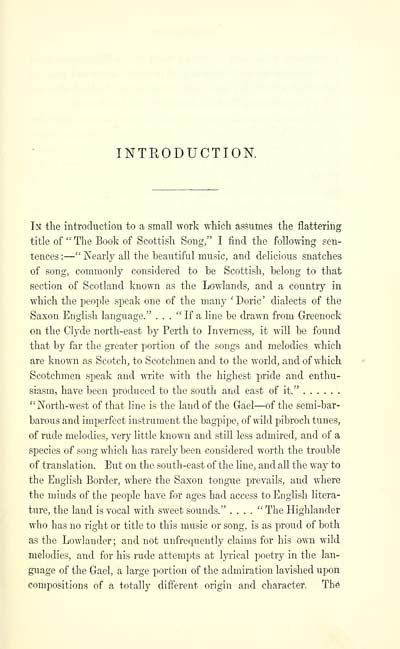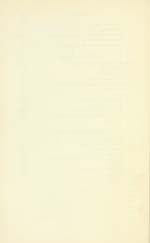Download files
Complete book:
Individual page:
Thumbnail gallery: Grid view | List view

INTRODUCTION.
In the introduction to a small work which assumes the flattering
title of " The Book of Scottish Song," I find the following sen-
tences : — " Nearly all the beautiful music, and delicious snatches
of song, commonly considered to be Scottish, belong to that
section of Scotland known as the Lowlands, and a country in
which the people speak one of the many 'Doric' dialects of the
Saxon English language." ..." If a line be drawn from Greenock
on the Clyde north-east by Perth to Inverness, it will be found
that by far the greater portion of the songs and melodies which
are known as Scotch, to Scotchmen and to the world, and of which
Scotchmen speak and write with the highest pride and enthu-
siasm, have been produced to the south and east of it."
"North-west of that line is the land of the Gael — of the semi-bar-
barous and imperfect instrument the bagpipe, of wild pibroch tunes,
of rude melodies, very little known and still less admired, and of a
species of song which has rarely been considered worth the trouble
of translation. But on the south-east of the line, and all the way to
the English Border, where the Saxon tongue prevails, and where
the minds of the people have for ages had access to English litera-
ture, the land is vocal with sweet sounds." . . . . " The Highlander
who has no right or title to this music or song, is as proud of both
as the Lowlander ; and not unfrequently claims for his own wild
melodies, and for his rude attempts at lyrical poetry in the lan-
guage of the Gael, a large portion of the admiration lavished upon
compositions of a totally different origin and character. The
In the introduction to a small work which assumes the flattering
title of " The Book of Scottish Song," I find the following sen-
tences : — " Nearly all the beautiful music, and delicious snatches
of song, commonly considered to be Scottish, belong to that
section of Scotland known as the Lowlands, and a country in
which the people speak one of the many 'Doric' dialects of the
Saxon English language." ..." If a line be drawn from Greenock
on the Clyde north-east by Perth to Inverness, it will be found
that by far the greater portion of the songs and melodies which
are known as Scotch, to Scotchmen and to the world, and of which
Scotchmen speak and write with the highest pride and enthu-
siasm, have been produced to the south and east of it."
"North-west of that line is the land of the Gael — of the semi-bar-
barous and imperfect instrument the bagpipe, of wild pibroch tunes,
of rude melodies, very little known and still less admired, and of a
species of song which has rarely been considered worth the trouble
of translation. But on the south-east of the line, and all the way to
the English Border, where the Saxon tongue prevails, and where
the minds of the people have for ages had access to English litera-
ture, the land is vocal with sweet sounds." . . . . " The Highlander
who has no right or title to this music or song, is as proud of both
as the Lowlander ; and not unfrequently claims for his own wild
melodies, and for his rude attempts at lyrical poetry in the lan-
guage of the Gael, a large portion of the admiration lavished upon
compositions of a totally different origin and character. The
Set display mode to: Large image | Transcription
Images and transcriptions on this page, including medium image downloads, may be used under the Creative Commons Attribution 4.0 International Licence unless otherwise stated. ![]()
| Early Gaelic Book Collections > Blair Collection > Selections from the Gaelic bards > (19) |
|---|
| Permanent URL | https://digital.nls.uk/75750087 |
|---|
| Description | A selection of books from a collection of more than 500 titles, mostly on religious and literary topics. Also includes some material dealing with other Celtic languages and societies. Collection created towards the end of the 19th century by Lady Evelyn Stewart Murray. |
|---|
| Description | Selected items from five 'Special and Named Printed Collections'. Includes books in Gaelic and other Celtic languages, works about the Gaels, their languages, literature, culture and history. |
|---|

